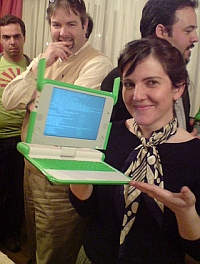With Nicholas Negroponte's "only government buyers" sales plan unable to generate any real orders yet, the "$100 laptop" price increasing to $205 per laptop, and yet another production delay for Quanta, I say its time for XO laptop retail sales in the USA.
But what would be the best way for One Laptop Per Child to sell its "$100 laptops" to American parents that would also support the OLPC Mission?
- eBay XO-1 sales wouldn't be practical at the scale of demand OLPC has generated. eBay is only a transaction site, it has no distribution system itself and would have to partner with FedEx or UPS to get laptops to buyers.
- Dell Computers might seem a good partner, they have the distribution network and sell Linux laptops already, but Michael Dell isn't sold on the OLPC goals.
- CompUSA is my choice. Not only does it have distribution capacity and could offer maintenance plans, its owner Carlos Slim, already bought 250,000 laptops for OLPC Mexico for use as eBooks in libraries.
I say that every OLPC XO sale will actually be a dual transaction very common in the nonprofit world. When a laptop is sold, the buyer will be informed that a portion of the sale price is going to the OLPC Foundation as a tax-deducible donation. Then the retailer will deliver the computer to the buyer, keeping a slight mark-up to cover logistics and administration. The remainder will be an unrestricted donated to OLPC Foundation.
Sadly, the sales price will not be $100 dollars, or even $200 per laptop. With the current cost escalation, OLPC will probably price the "one for two" package around $400. Which will put it in direct competition with the Asustek's Eee PC and WalMart's Everex laptop.
Now the XO is specifically designed for Constructionist learning, just one more aspect of its revolution in computing, but do American consumers know that? Or are they really just driven by price points?
I offer that OLPC should be aware of this when they do a buy two, get one program in America. They need to keep the price below $350. Or they can reverse their sales strategy to promote the donation, not the computer. Make it like a NPR fundraising drive:
Donate $400 to OLPC Foundation to support education in the developing world, and you'll get an XO laptop!That way, when we buy OLPC's clock-stopping hot technology for every kid (and kid at heart) on the block, we'll not mind the cost.




Don't ignore the amount of money it takes to do distribution and support. In planning commercial consumer products you generally have to allow for a doubling of price for each tier of distribution. That's generous and good for conservative financial planning, but it isn't just "a slight mark-up".
Distributors only have so many square feet of warehouse space, so many employees to break carload shipments into smaller units and package them, and so much capacity to track orders both going out and coming back. They have to pay that rent and those salaries and need to get that much back as well as enough extra so they cannot be accused of running a charitable institution.
Asking them to take on a product with very low returns is asking them to forgo higher returns that other products offer. If you have shareholders they get very concerned about this "opportunity cost".
Dell was able to reduce their distribution costs fairly radically by building to order and shipping next day, but Best Buy is a classic brick-and-mortar store with all of those accounting problems. Maybe they could run a back-office warehouse operation but XO would have to pay for all that.
Certainly OLPC's pricing model is dependent upon not paying for any of the distribution expenses, and it has apparently become a big problem for them when their intended customers realized that those costs would devolve upon them.
Folks,
For an update on OLPC business prospects by a "real" entrepreneur, see what Fake Steve Jobs has to say:
http://fakesteve.blogspot.com/2007/09/100-laptop-now-200-and-delayed-again.html
A bit blunt, but there are many who will agree...
Oh. My. God! FSJ just exposed all the hype and fantasy around OLPC and the media lust in one concise article. I'll be OLPC News posting on that in short order!
Given the speed with which cell phones have multiplied in the developing nations I wonder whether the XO will have that much of a chance.
Developments like the proliferation of Linux-based smartphones suggest to me that an explosion of applications, services and add-on hardware may soon take the spotlight off computers, $100 or any other, and put it on the cellphone.
Articles like this:
http://www.linux.com/feature/119159
...are certainly biased in the point of view but that doesn't mean there isn't some, perhaps a lot, of truth in them.
Allen, would you be willing to give up your desktop and laptop and do everything -- surfing, writing reports, composing emails, running various application programs -- all on a smartphone?
Cell Phone vs. Computer is a common argument and I think there is room for both. I'm not going to be reading a book on a cell phone but there's no need for me to lug a laptop around if all I want to do is send/receive 128 characters of text.
fsb,
"Ever wonder why nobody, and I mean nobody, ever stopped to think about whether the whole thing could actually work?"
Not true. People like Bill Gates, various commenters here, and many others were criticizing the project from the begining.
"The truth is, the average filthy hack knows even less about business than the average MIT professor."
But if the XO is such a poor business idea, then why did the world's largest manufacturer of laptops get behind it, not to mention the various major businesses such as Google and and now Intel?
"Somehow, trust me, the whole thing will be presented as a sad tragedy"
Actually, it is already a major success in that it has forced oem's to start developing computers for the developing world.
All the article really proves is that fsb is a loud-mouthed idiot.
If we assume that governments will ignore the XO in droves, as seems to be the case, the only other technology to which the citizens of developing nations have wide-spread access will be pressed into service. Most likely by the citizens of the nations themselves without much regard to the national government's policies or lack of.
That's provided there's any "service" to press them into of course. I've yet to see a clear-cut example of the success of the use of computers in education and I've been waiting a long time.
I figure that at some point the magic will happen but I'm beginning to wonder if it'll be this century since a good chunk of the previous century was filled with predictions of the value of computers to education.
One massive advantage cell phones have over the XO, and all computers for use in education, is that the cell phones are already in the hands of poor people for reasons unconnected with education. But poverty has plenty of necessities associated with it and necessity is the mother of invention.
I'm wondering when some sharp Ghanian or Ecuadorian kid gets his hands on a slightly worn Linux phone and upends the entire educational universe. It could happen here in the U.S. but we've got such a massive educational bureaucracy that good ideas have to struggle to keep from being buried under an avalanche of indifference.
Poverty, and what appears to be the indifference of governments of developing nations to the education of their poorest citizens, may be the incubator of the ideas that'll set education free of the Socratic technology that's the current high-water mark of the institution.
allen,
"If we assume that governments will ignore the XO in droves, as seems to be the case, the only other technology to which the citizens of developing nations have wide-spread access will be pressed into service"
No, even if XO fails to take off, the fact that it has pushed oem's to look at the developing world, plus falling component prices, mean that in two or three years similar computers that poor people can afford will be on sale, anyway.
"I figure that at some point the magic will happen but I'm beginning to wonder if it'll be this century since a good chunk of the previous century was filled with predictions of the value of computers to education."
But computers like the XO are useful for the whole society and economy, not just education, so there are lots of reasons that people will buy them.
Remember, for over a decade cell phones were luxuries that most of the people in the world couldn't afford. Then they became cheap enough to be adopted universally. With the XO and similar machines, the same thing is about to happen to computers.
I find Wayan's Public Broadcasting business model idea to be a spot on way of marketing the XO. Having been employed with the local PBS/NPR affiliates for two decades now, I have seen the success of $5 coffee mugs with a station logo turning into $50 "thank you for your donation" gifts on a regular basis. People aren't buying a coffee mug. They're supporting a service with a cause. I'm not suggesting that OLPC do a tenfold markup on the XO to accomplish this but it is certainly a way to sell their education mission to the US public and move some computers while generating cash at a good profit margin.
What OLPC lacks is a broadcasting infrastructure (ie: ten minute pledge break on your TV before returning you to Bill Moyers) but they do have the internet and access to 800 phone lines. That alone should be enough. They don't need eBay to get the word out . . . and act as a (money absorbing)
middle man. Some well placed magazine ads (and not necessarily just in computer publications would serve them well to spread the word and direct consumers to their web page and toll free phone number.
OLPC also lacks, as is comprehensively addressed above, a sophisticated mail order "brick and mortar" series of stores or their own
distribution network. But, unlike the CompUSAs or
Circuit Citys of the world, they are only selling one product. This makes it a far easier task to accomplish than if you have thousands of products to keep track of. Given that a reasonable floor space can be obtained (not far from the shipping port where the containers from Quanta will be off loading), all you need are folks to answer 800 numbers, process online orders and do the actual labeling and packaging. USPS, UPS, Fed-X and others do the rest. I'm not saying that it's a walk in the park to set up but it is certainly doable . . . and you eliminate the need for retail store middle man.
OLPC will also need more in the way of real tech support than their current wiki provides (as I found out last month in my attempt to extract simple information from them in regards to the size of the jack on their power supply.) But, once their engineers are not consumed with the final development phase of version 1.0 (as was the case when I interacted with them), a portion of them could be reassigned to customer tech support (both phone and web) while the rest of the group begins working on next generation software/hardware.
Can OLPC morph into a real business to cater to US consumers? Given the paucity of foreign goverment orders at the moment, I don't see that they have any other choice but to do so.